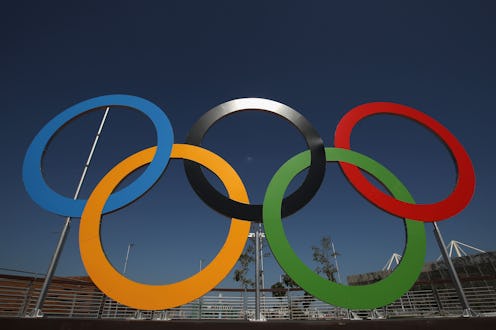News
This Opening Ceremony Will Be A Little Different
Although some Olympic events already began on Wednesday, owing to the early start of the Rio games' soccer schedule, the event doesn't really start until Friday, Aug. 5, when the opening ceremony will be broadcast out to the world. Athletes from all over the globe will appear, marching in the usual Parade of Nations, and taking in all the excitement of the event. However, it's reportedly going to look a little different from the grandiose affairs of years past. If there's one fact you should know about the opening ceremony in Rio this year, it's that it's going to cost a whole lot less than the one in London in 2012. Specifically, it's reportedly going to cost roughly half of what was spent in London, amid dire economic straights inside Brazil.
It's not as though the cost-cutting comes as a surprise. All the way back in October 2015, Rio 2016 communications director Mario Andrada cautioned that the games had to be less extravagant and expensive than some of them in years past, or it could stir up some major discord among the Brazilian public. Olympic organizers had aimed to cut 30 percent of expenses overall, and the opening ceremony, with all that pageantry and choreography, always tends to be a pricey affair — back then, organizers had envisioned the Rio edition to cost just a tenth of London's ceremony, which would have been around $4.2 million dollars.
Now, despite it still being cheap in relative terms, it's being reported that it won't be nearly that lean. As Karolos Grohmann detailed for Reuters on Wednesday, the Rio opening ceremony is expected to cost around $21 million, right around half of the $42 million spent on the 2012 opening ceremony in London.
Needless to say, that's still an eye-popping figure to most people, especially within a country like Brazil that's suffering through some devastating economic turmoil, mixing mass poverty with an already volatile political climate. By contrast, 2008's climactic, awe-inspiring opening ceremony in Beijing, China reportedly cost more than $100 million.
The ostensible reason for the low-cost approach — or lower-cost approach, to be more accurate — is that very same economic blight. Brazil's in bad shape right now, and just as the World Cup in 2014 stoked outrage on the part of many poorer Brazilians who would've preferred more money in their pockets, or more food or better health care, or simply safer living conditions, an egregiously opulent ceremony could potentially be inciting. In June, as The Guardian detailed, Rio's governor declared the city in a state of financial crisis, warning that it was facing a "total collapse in public security, health, education, transport, and environmental management."
On Monday, Olympians and tourists were encouraged to avoid dipping their heads underwater while in Rio, thanks to high amounts of untreated sewage in the city's waterways. The air quality is also reportedly horrendous, and some of the Olympic venues weren't even properly finished. Simply put, there are far more pressing concerns right now than how much flash, excitement, and eye-popping choreography can be mustered in the opening ceremony.
It'll still likely be an impressive show, sure, but you should expect it to be a slightly stripped-down affair, commensurate with the political and economic optics surrounding the games. Make no mistake, however: on the whole, the cost-conscious rhetoric from the IOC ultimately fell through, as the Rio games overall have still run more than $1 billion over budget.
